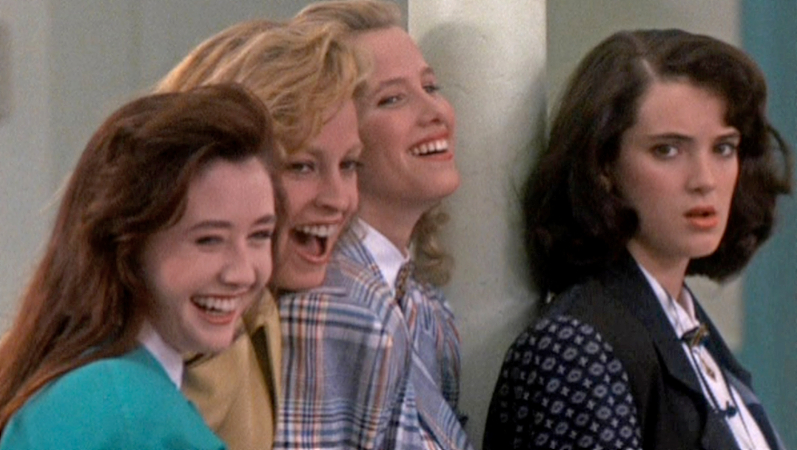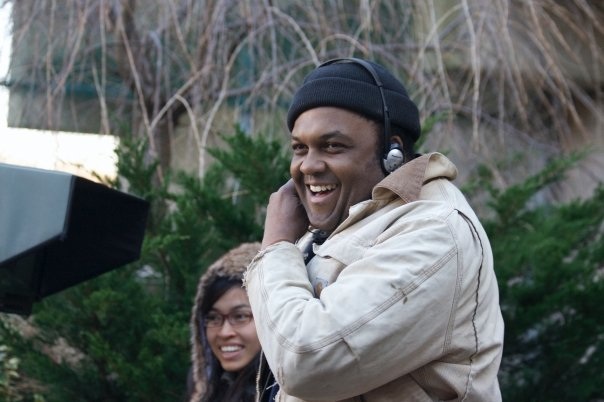
For a writer the genesis of a story can come from a number of different places, inspirations or experiences—some real, some manufactured, but most, a hybrid of both.
For writer/director/producer, K. LORREL MANNING, the inspiration for his first feature initially came to him in the form of a book he discovered in 2004. Nina Berman’s Purple Hearts Back From Iraq — a remarkable compilation of photographs and essays about servicemen and women wounded in the Iraq war — captivated him with what soldiers were experiencing once they returned from combat. Fueled by a desire to understand the world of PTSD (post-traumatic stress disorder), Manning began researching and interviewing veterans with the hope that his next “project” would emerge.
It didn’t take long before he met an Iraq vet-turned-police officer, who would serve as the catalyst for a short, eleven-page play about two war-torn veterans reuniting in a hospital called Happy New Year. For one of the lead roles, Manning called upon a friend he had freelanced with at a law firm in New York, MICHAEL CUOMO, who was also an actor working hard to cut his teeth in theater. Cuomo would prove to be more than just an actor in the stage production: he worked closely with Manning on the development, adaptation, producing and lead performance on both the short and feature films.
The feature version of HAPPY NEW YEAR follows the story of Sgt. Cole Lewis (Cuomo), a war-torn marine who returns home from combat to find humanity, compassion and friendship in a group of similarly injured veterans in the psychiatric ward at a Veterans Hospital (watch the trailer below).
What began for Manning and Cuomo (or “The Guys” as they refer to themselves) as an exploration into the minds of wounded veterans, would eventually become a four-year quest to present an issue that much too often goes unnoticed by society. With support from numerous veterans groups and big-name critics like, Elvis Mitchell, their goal is to have the film in theaters by November 11, 2011—Veteran’s Day.
It was in Austin, Texas at the 2011 South by Southwest Film Festival, only days after their world premiere in the Narrative Competition Category, where I caught up with the Guys. In a small room at the downtown Hilton that served as both their sleeping quarters and festival war-room, we had our first of what will be three conversations chronicling their journey along the festival circuit.
Happy New Year opens the 2011 AMC Theatres Kansas City FilmFest (sponsored by AMC Theaters) tonight at 7:15PM in Missouri.

WILL PRESCOTT: So, Michael, what did you think initially when you first read Lorrel’s short play?
MICHAEL CUOMO: I’ve told Lorrel this story a million times. My printer was broken so I was reading it off my laptop. I got through it and I went back to look at something, and my computer was all fuzzy and screwed up. I couldn’t figure it out, and I stepped away, went to the bathroom and realized my face was flushed with tears. But I wasn’t sobbing, it was almost more like an unconscious reaction to something. And that’s when I called him and was like, “We’ve got to do this play.” Because if I’m reacting this way, imagine how other people are going to react.
WP: How did it finally get on stage?
LORREL MANNING: I, Michael and another actor by the name of William Oliver Watkins were getting together to explore these characters and I was filming it and everything. And around this time, I was talking to Lee Brock (co-artistic director of the Barrow Group theatre company) about the play and she said, “We could put this in the big theater. Make it a two night thing.” And I said, “Sure.” But then she called me back later and said that they had the one-act play festival coming up and that she was not very happy with the plays that were coming in. She said, “Why don’t you take it over and make this the one-act play festival? I was like, “Lee, I only have two-months to put that together and she says, “You can do it.” [laughs]
WP: That’s where it premiered?
LM: Yeah. I hired some directors and put out this big call across the country for war-themed plays. We went through this whole process of vetting these plays trying to find which ones were best. And then I took Happy New Year and another play I had written and submitted it to the group and took my name off of it and that play (Happy New Year) got through. And they were like, who wrote this? And I said I did. [laughs] And they didn’t know that. But it got such high marks so it was able to play at the festival. The festival ran for six weeks in NY and was very successful, sold out almost every night. It was a way for us to make people aware of the issues. Each of the plays dealt with the war, not overseas but at home.
All these plays had a different take on the effect of war on the American psyche. They were all great plays but Happy New Year was the central piece because it was very hard hitting and closed out the night. One night a group of military mothers wanted to come and I was quite nervous because this was the first real test of anyone connected to the military would see the piece. I was unclear as to whether or not they’d respond to what we were doing. A few of the mothers stayed after to talk to us and they said, “You have to do something with this. It can’t just stay here in NYC. People have to know about these issues and what’s going on.”
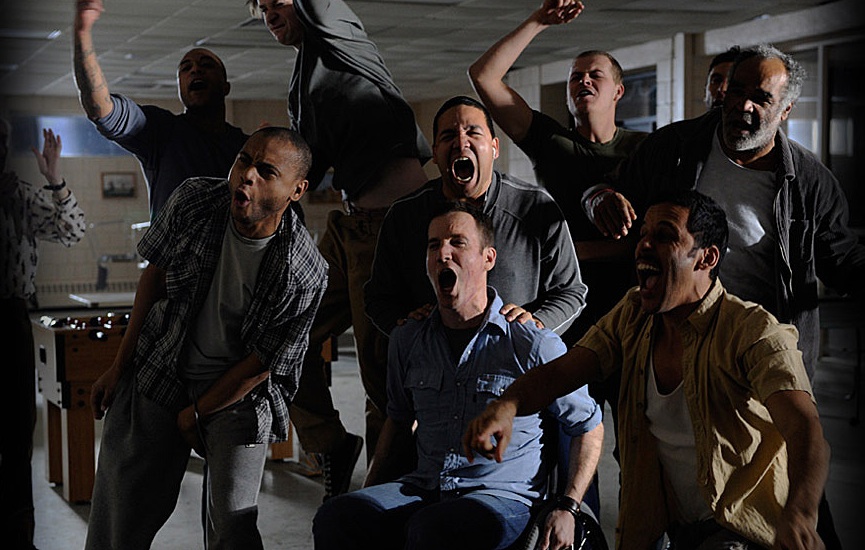
WP: And thus the short film was born.
LM: We got together in Michael’s apartment on the 4th of July in ’07 and wondered how we were going to raise the $20K that we needed to make the film. We put together a letter writing campaign. Had a benefit show. Reached out to family friends. All kinds of stuff. So over the summer we raised the money and six weeks after the show closed we were shooting the short film adaptation.
WP: So, what were some of the things you did specifically, in terms of development, to transform the story from stage to screen? How were they different? What were some of the lessons you learned to improve the filmed version?
MC: Well, the stage version is essentially two guys in a hospital room, right? It’s dialogue driven. It’s their story and the story of their relationship. It looks at New Year’s Eve as an interesting metaphor for looking at our lives and asking, “What’s next?” What do we want to do different in the New Year? Two guys who were greatly affected by their experiences overseas who are now reuniting.
WP: Right.
MC: And the main thing for us is that we wanted to get it to festivals. We were looking at Sundance, and Cannes and all of the biggies. And Cannes helped determine what a short film should be because they wouldn’t accept anything over fifteen minutes.
WP: How long was it?
MC: The play was about twenty-five minutes. So we immediately said, “Oh shit,” if we want to have a shot at something like Cannes, the film will need to be shorter. And Lorrel already had ideas on how to adapt it and jokes we could take out of the script that won’t take away from the relationship. It’s just that less is more. So much more can be seen because of the intimacy of film as opposed to theater. So, from an acting perspective, it was the first time in my life I had something—you know, with most films you come on with little rehearsal—but this was incredible because both myself, and William Watkins, who were in the original play, were going to do the short film with the original writer/director. So, for us, one of the things that was so cool, was that the characters were already so in us. We knew these guys. We knew our lines. If anything, we had to relearn beat changes and things like that because it was now going to be condensed and you were going to have to get to certain places quicker, emotionally.
WP: Where did the short premiere?
LM: The Cleveland Film Festival.
WP: And what were some of the other highlights of the short’s festival run?
LM: Two of my favorites were the Rhode Island and Maryland Film Festivals. Two of my favorites by far.
WP: How did (Executive Producer) Iain Smith get involved?
LM: We were looking for a good makeup artist for the film. In the play Michael looked very sickly, but I wanted him to appear more deteriorated in the film version.
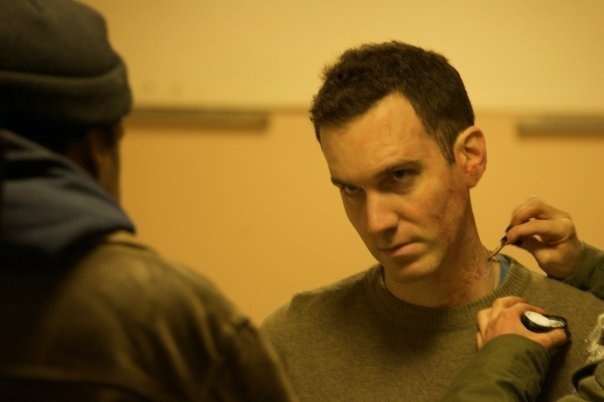
MC: We put an ad out for a makeup artist. The first person to respond was this woman, Ailie Smith, who said she was located in London but worked on Harry Potter and Cold Mountain. Said she was planning a trip to New York and if we were willing to help her find housing, per diem for food, and money for supplies, she’d be willing to fly over for the project. She sent us a sample and Lorrel looked at her resume and was like, “let’s hire her.” So we did. But then a week later, she wrote back and said she’s really sorry, but she can’t afford the expense right now. And we were only two weeks out from shooting. So, our producer, Karl Jacob, said he was going to search for someone else. I emailed her a plea, asking if there was anyway she could reconsider, writing something like ‘we want you on this movie and we think it’d be better with you involved.’ And it worked.
LM: And she came in. The day of shooting. She’s doing a makeup test on Michael and casually tells us that she’d shown her father the script and that he really liked it. I asked if he was in the film business, and she said that he was a producer. And I asked what he’d done. And she said, oh, you know, ‘Children of Men, Cold Mountain, He’s worked with Brad Pitt a lot.’ And Michael and I are like, “What?” Quick, IMDB him!” [laughs]
WP: So her dad is Iain Smith?
LM: Yeah. And maybe two months later we were close to our fine cut of the film and she checked in and said, “You know, my dad’s in New York this weekend. Would you want to show him the film?” And we were like, “sure.” So, he watched the film, and we met him the next day for a lunch that ended up being over three hours long. He was so blown away by the short film. We talked about spirituality, and art, and the business. He gave us so much advice and said we really should expand the short into a feature film. I was like, “You know, we thought about doing something like that, but not exactly this story.” He was like, “No. No you need to expand this film.” I was very intrigued by the idea.
WP: So you started writing.
LM: I started working on the treatment and adding more characters. A lot of multi-ethnic characters. Things I’d been wanting to tackle. So I’d do a treatment and send it to Michael for feedback. And then do another one. I eventually said we should share story credit because he was adding some really good ideas.
WP: Well, at this point you guys had already become a strong partnership.
LM: Yes. Our friendship had grown immensely. We started to think alike. We challenged each other creatively. So, as we were finishing the short film, I was finishing the feature treatment and then a draft of the script that we got to Sundance.
MC: We submitted it to the Sundance Writer’s Lab. It made it to the final round, but was ultimately not accepted that year for 2008. But Michelle Satter sent us a really nice letter saying of the thousands of scripts we made it to the final round and encouraged us to make the film.
LM: One of Iain’s big points was that if we wanted to make the film that we wanted to make, it was important to keep the budget low. ‘Then you’ll be able to showcase yourselves and also be in control of how you present this issue that you feel so passionately about. This is a challenging issue. These films haven’t done well. But if you feel passionately about it make sure you are in control of it.” So that’s why we kept the budget low and remained true to each other. So, Michael and I made made a pact with each other that said, “I’m not gonna dump you, and you’re not gonna suggest I leave the project so someone bigger can come in.” We made that commitment to each other and knew it would be an extremely hard road to travel, because the first thing that happened once we started going out there we were bombarded with questions – “You’re an unknown writer/director, and you cast an unknown actor in the lead, plus it’s about Iraq? Come on? Why doesn’t Michael take a supporting role. Or why don’t you sell the script to someone else? Or, if you’re gonna do it together, why not take on a different subject matter?”
WP: Who were some of these people saying this?
LM: A lot of them were producers.
MC: Agents.
LM: And we both said, “No.” And they said, “Obviously this film isn’t getting made.“ So, it was a very long road. While the short was on the festival circuit, we were trying to figure out ways to get the feature made. I was turning out drafts, we were interviewing veterans and military personnel. At the same time holding down full time jobs.

WP: Were you guys still working at the law firm?
LM: Yes.
MC: Yeah. At night. 7PM to 2AM.
WP: Wow.
LM: So during the day, we’d get to our film office at 10am and work on the film all day, and go to work at night.
WP: And so you found it helpful to have the short out there. You’d go to the festivals with a backpack of scripts or whatever and be like, hey, here’s a feature version of it?
LM: Yeah. A lot of people suggested that we don’t make a short and go right for the feature.
MC: That’s the thing. People said, why use $15-20K on a short when you can make a low budget feature for $50K? Luckily, we didn’t do that. We stuck to our guns and made the short. It was a very wise choice. Because as a young director and young actor, in terms of a career, it was good to have that short as a calling card, to show people a small portion of what to expect. Of course, if you do that, you better make sure the short is a microcosm of what the film will be. In that, it kind of needs to be the quality, and ideally if that actor, who is unknown, is gonna be in the feature, he or she should be in the short. So anyone who questioned my ability, or Lorrel’s ability, could look at the short, from an investment perspective. Instead of sending them a 120 page script, or even a 20 page investment document, we could bring a group of people in a room like this, play them the short and discuss the investment structure. That process, of course, took a lot longer than it should because every film about the Iraq war was getting killed at the box office.
WP: Right, but what was your goal with this film? Was it to get it into theaters and get a huge box office or get this story out there? What’s great about you guys, and this whole story is the drive that you had to get this issue out there in the face of all this box office talk.
LM: Talk about sticking to your guns, we both did. I got approached for other plays and feature films to direct. Had to step away from that. Michael stepped away from a management contract. They wanted to take him on the road and get him out there doing regional theatre and tv pilots.
MC: It was hard because I was unrepresented at the time. I’m still unrepresented for legit film/tv. But it was hard, because you always want the ear of these people, and they have a plan for you. But that wasn’t my plan. And now I have something that I’m truly proud of. It’s one thing to be an actor sitting at Starbucks waiting for your agent to call to tell you if you got that job. It’s another thing to take the power back in a way and produce your own vehicle. It’s great to have an agent, but so many friends of mine were in this spin cycle of “What do I have to do to become that star name that the casting director is seeking and not get boxed out.”
LM: We both said we’re not gonna wait for anybody to give us anything anymore. We’re gonna do what we want to do and just go for it. That lunch with Iain is what really did it. “You gotta take it, boys.” [laughs]
WP: Totally. You look back at the people we all admire that we grew up watching—they all started out like that. They all went out and just did it.
LM: Don’t get me wrong. It’s not like everyday was great. There was a lot of second guessing. Should I take this job? Should I take that job? But we were good at talking it out. Supporting each other.
WP: That’s interesting. I’ve heard people advise against turning a short into a feature because you have a lot of projects in you. You do the short and that’s gone. Now do the next thing. Was it frustrating pushing that stone up the mountain, and not getting sick of working on the same thing over and over again?
LM: What really kept us going were the interviews we were having with the veterans and their families. They were just so moving and we cared so much about the issues that the film presents. Sometime you go so far down a path and you can’t turn back. We were so into it – physically, spiritually, mentally. We thought, “Yeah, these (Iraq) films aren’t doing well, but maybe this will be the one that does.” The response we got from veterans who saw that short was enough to keep us going. Even after the interviews they’d say, “No matter what happens, please keep going. Make the feature film.”
MC: My frustration with the project came from the fact that I wasn’t doing a lot of acting. We weren’t really workshopping the script because we were promoting the short, working on the script, trying to raise money. Trying to understand what it meant. I always joke and say I felt like the cat in the hat. Where you’re juggling a bowling pin, and a fish bowl, an encyclopedia, a baby, a dog, a cat, and a bed and you’ve never done it before. How will we get this thing made? But we were both in this spin cycle of “If we took on another project, what would happen to this one?”
WP: With all the energy you were putting in, did you ever think it wasn’t going to happen?
MC: It was a real risk if it didn’t happen. My friends were saying if this doesn’t work, do you feel like you’ve wasted two years of your career? My response was “It’s going to work out.” Because, to be honest with you, I couldn’t let those thoughts into my mind because if I did, I would’ve stopped working. If there’s any advice I can give, it’s that no one is going to believe in your career—whether you’re a writer, director or an actor—more than you. Ever. I don’t care what agency you’re with. Who you’re dating. There’s this great line in The Departed when Jack Nicholson says, “When you want something in life you can’t ask for it — you just have to take it.” In the case of The Departed, there’s a criminal element to it—
WP: Really? There is? [laughs]
MC: [laughs] There is a criminal element to it, but I think it does apply to this conversation of, when you want something in life you can’t necessarily rely on a studio, or an agent or a casting director, to really validate you. At a certain point, you have to validate yourself. I can say as an actor there’s nothing more rewarding then knowing the script you’re attached to is not only gonna get shot but also get completed and you have a big hand in that. As a lead producer on this movie, I was invited in the editing room. Not everyday. But I got to look at the first cuts. And that’s an incredibly complicated relationship.
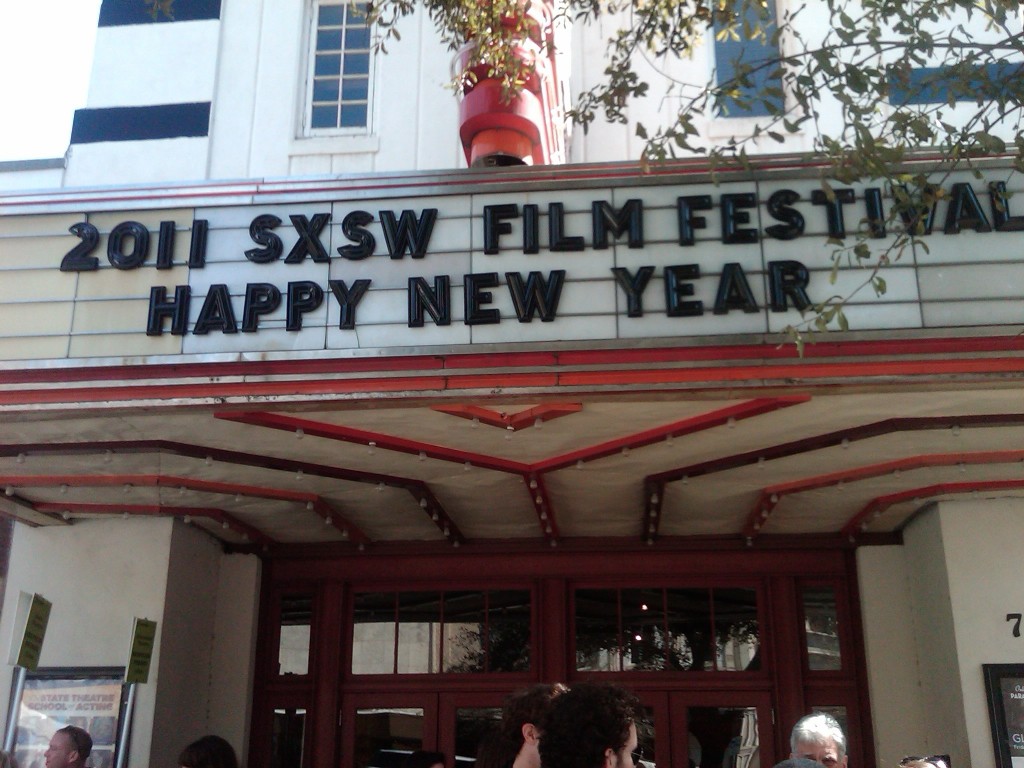
WP: And now here you are. At SXSW. You premiered on Saturday. March 12. How did that feel? After all these years? After all these things you’ve given up and sacrificed. How did it finally feel to just play it?
LM: I felt two things. Immense joy. And immense sadness. I felt immense joy in the fact that it was a reward for everything we had done, a gift for all the people who stuck by us and who really came through for us. The actors could see their amazing work, as well as the editor, the cinematographer. Everyone could celebrate. We stood here in our hotel room right before we walked over to the theater and gave each other a huge bear hug and said “This is fucking amazing, man.” We’ve been working so hard that we have a difficult time stepping back and seeing the accomplishments that we’ve made. Family and friends, flew in from NY and all over to support us. However, I felt sadness in the fact that I quickly realized how enriching and challenging the journey has been and that I’ll probably never have this experience again. I’ll never look at this process with virgin eyes asking, “How do you do this? How do you do that?” There will be more discoveries, and challenges, but I will no longer be this uneducated kid trying to figure out how to make things work. There is great beauty in learning. It was back-breaking work, but there was a beauty in it. Kind of like learning to ride a bike for the first time. Or getting your license. I’ll never have that experience again. So there’s some sadness with that. But would I go through it again? Hell, no! [laughs]
WP: How about you, Michael? How did you feel?
MC: I felt great. It was incredible when we got the call from Janet Pierson and she was so moved and wanted us in the festival, eventually, a competition selection.. Especially with all the doubts we’ve talked about and the voices of dissent people had shared with us over the years saying, “You making the right decision?” There was a degree to which I trusted in my heart and telling the story no matter what and I wasn’t wrong. If that makes sense. I haven’t been working in a vacuum for the last three years on something that no one’s ever gonna see. As an artist that’s all you have. Your work that you’re gonna leave behind. I went through a serious personal relationship during this time that didn’t work out. At one point my mother said to me, “It’s okay. You’ll find someone else.” I said, “Maybe I will and maybe I won’t.” And she said, “Surely you want to have kid and a family.” And I said, “Is it alright if I don’t? I mean maybe I will. But maybe these films are the things I leave behind instead of a child. Maybe that’s my contribution to society.” Maybe it’s not. I don’t know. But if that is true, if you are making sacrifices for certain things, you at least want to see them born in a way. Happy New Year was “born” at SXSW.
WP: Absolutely.
MC: You want to birth these things into the world and share them with people and if they are meant to shake things up and affect change, you know socio-politically, you need a place like SXSW to launch you. Or Sundance or Tribeca or Los Angeles, or whatever the usual suspects are, so you can then go take your film out into the world into theaters and reach more people. And then do it on another project.
WP: It’s about leaving a body of work.
MC: At the State Theater I remember looking up at the marquee and it said SXSW 2011 Happy New Year. My aunt and uncle were there. A lot of friends were there. And we’re on a fucking marquee. We made it. But look. There are new challenges. With sales and distribution. And those two guys who were in a 10 by 10 office for two years trying to make a film are now trying to sell a film. You better believe there’s more meetings and getting advice…lots of new challenges.
WP: So clearly you’re going to be with this project for a while. Do you have any plans to jump on something new? When do you ever leave this project?
MC: That’s a great question.
LM: Great question. We don’t know.
WP: I mean, is a mini-series for HBO next? [laughs]
LM: We do want to continue working together. But a lot is dictated by what happens with this. Michael will probably get offers to act in more films, and I will probably get more writing and directing opportunities. As far as working together again, the plan is to do another film called Red House, which I’m working on right now. If the script takes off and people want to fund it, we’ll shoot this summer. Or the Fall or whatever. But that’s all up to the gods I guess. Michael would be the lead and I’d be the writer/director. It’s a great working relationship right now. I see it as Scorsese/De Niro or Scorsese/Dicaprio now.
MC: Yeah. Eventually I’ll be aged out. [laughs]
MC: Right now it’s hard to dictate what’s next. People are like, “You’re done.” Not yet. We’re not done. We want to see this in theaters in nine months. And there’s gonna be a lot that goes into that. I think we do, for lots of reasons, need to work on other things. But how that happens is a little unclear right now. And that’s alright because, as Lorrel says, “It’s gonna be linked to the response to HNY,” which has already been really positive and is growing. And we’re talking with agents and managers on both coasts, so we’ll see how it all comes together.
WP: Great, guys. I think we can end on that.
MC: It’s taken a lot to get to this point. It’s been a lot of work, but it’s been a great time.
For more information on HAPPY NEW YEAR, check out the Facebook Page. If you’re an independent filmmaker or know of an independent filmmaker we should interview, email blogadmin@sagindie.org for consideration.

